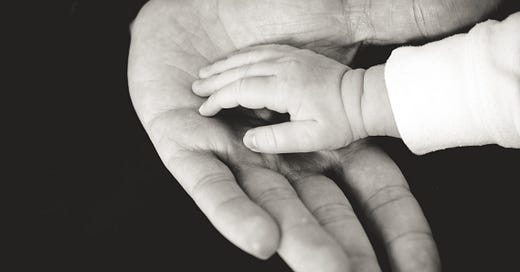Reflections On Being Human is a reader-supported publication. If you would like to create reciprocity for my work and receive full-access to all of my articles as well as exercises and activities to help you live with more conscious intention, then I invite you to become a paid subscriber. You can also sign up for a 7-day free trial to get a taste of the content you will be receiving. Your support is greatly appreciated.
*This post includes a brief interaction from a client session, which this writer acquired permission to use.*
“Ah, go back a little bit,” my client said.
I stop and move my Brainspotting pointer back about an inch. “Can you tap into it pretty well here?” I ask.
“Yeah I feel like if you keep going left I’m going to lose it.”
“Okay. I trust you. You’re going to know better than me” I respond.
“Thanks. That’s fitting considering the topic.”
That day we were focusing on this client’s feelings of rejection as well as the subsequent “anxiety spiral” that tends to follow. Naturally, this often leaves the client is second-guessing and not trusting themselves.
Honestly, this is a pretty common pattern that I see with many of my clients. It might just show up a little different for each one, but the root tends to be the same.
Not trusting ourselves, I feel, is a pretty common pattern that I see in my practice. I frequently see clients habitually asking me things like:
What should I do?
Is this wrong?
Did I mess up here?
And if the person isn’t directly asking me a question like this. It can sometimes still be alluded to in comments like:
I feel the need to shut down and I don’t know what to do cause I fear of others noticing my emotional state.
The questions are often stemmed from some inner fear, anxiety, or worry — and it makes a lot of sense why.
Whenever I hear questions or comments like this I always get an image of a young child who is uncomfortable. They’re trying to figure out how to be a human in the world and the adults previously told them how they were “wrong”, “bad” and “need to do better”. These responses from adults created the inner discomfort in the child. When, in reality, the child needed attunement from an adult as well as empathy and compassion for their experience.
Essentially, its shame — the thing that is, arguably, the most pervasive in our culture (and, probably, even world).
So of course it’s hard to trust ourselves if we spent our childhoods not being met where we’re at and being shamed for simply being human.
We weren’t fully taught how to be in the world in a way that keeps us true to ourselves, because we didn’t receive the attunement we really needed.
And I don’t say this to “blame parents”, as I don’t believe that this issue exclusively stems from the parents themselves. That’s a far too individualistic way of looking at it.
Just as each person doesn’t live in a bubble, neither does each family unit. The reality is that it’s a generational problem, a societal problem, a cultural problem, and a systemic problem.
There are a lot of external influences that make it really, really hard for people to meet the needs of both themselves and their children. It is not 100% on each individual’s trauma and conditioning that’s making it hard to fully attune and support one another so we can live to our highest potential — that wouldn’t be realistic.
So it’s important that we look at both the individual and family units as well as all of the external influences as well. After all, that would be the only way we would ever be truly looking at things holistically.
However, I will also say: That despite there being systemic problems, that doesn’t mean that our individual reactions and work on ourselves doesn’t and can’t have a positive impact… because it does and that’s happening every day.

Late last year I took the Phase 3 Brainspotting training.
The training was led by the person who discovered Brainspotting — a fellow psychotherapist by the name of David Grand. The Phase 3 training is an advanced training that is, generally, for those who are either already certified Brainspotting Practitioners or they’ve, at least, taken Phases 1 & 2. The training provides information on how to do more advanced setups as well as a taste on how to do things like Expansion Brainspotting (Brainspotting to enhance or expand something that was a positive experience), Brainspotting for Sports Performance, and Brainspotting for Creative Expression (for actors, musicians, artists, etc.).
The 3-day long training ended with a keynote where David told the story of how he discovered Brainspotting by making a mistake when doing EMDR with a figure skater.
He told this story to encourage us, as clinicians, to be a little easier on ourselves. To be okay with mistakes and to remember how, sometimes, a mistake can lead to a new discovery and a whole new life path that you never would’ve taken otherwise.
And then he said something that I have never in my entire life heard from a teacher, let alone a person of authority.
He said, “Brainspotting is not mine. It’s yours. It’s your clients. It’s for you to discover and create whatever it is you might discover from it.”
Upon hearing the words, tears immediately ran down my face.
I had met a teacher who was not only trusting me, but my fellow clinicians and my clients.
Which led me to wonder: Perhaps the way that we learn to trust ourselves is by others showing us their trust in us.





